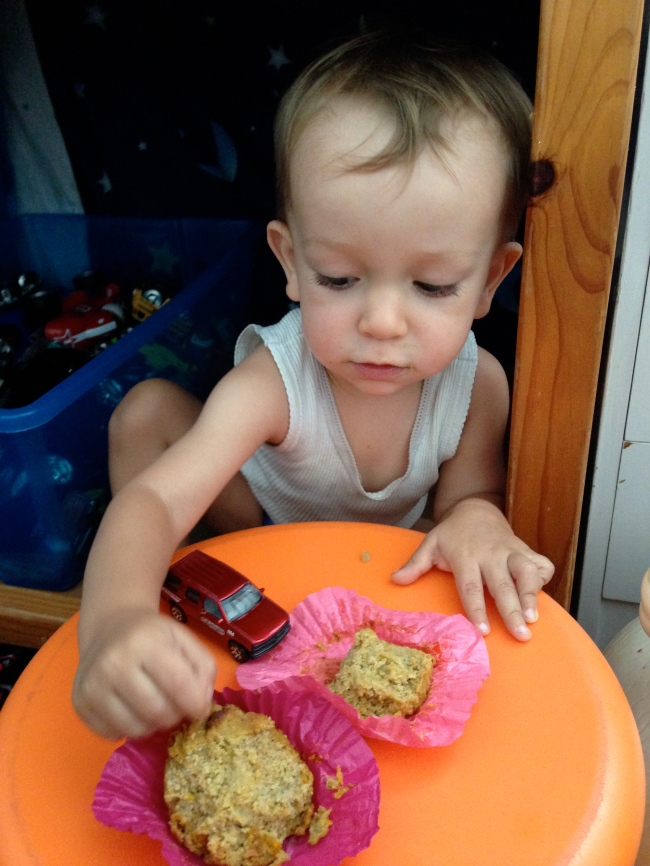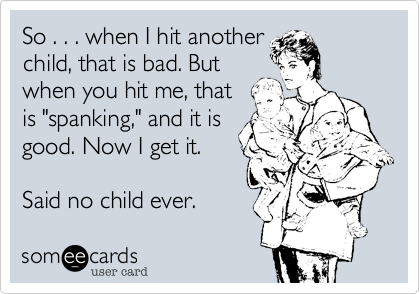This mornings battle was getting Joey to eat his lunch. You see he’s a little skinny, and while he’s happy to eat a large variety of foods, he doesn’t spend all that much time eating ANY of them except frozen peas and blueberries. I had served up a toddler version of my lunch, as I always do. Today was zucchini, feta and chicken. He likes all these foods, so it shouldn’t have been a problem, but after a few bites he refuses and asks for milk, or to watch Curious George or just to run around. His mouth clamps shut, hands go up, food goes flying and I get cross. Usually I give up, because eating shouldn’t be a battle, but this morning I remembered that I know how to manage this stuff. I changed my plan, and now I have a happy child and an empty bowl. So, how did I do it?
Step 1. – Find out what is rewarding to him this very minute. It might not be the same as it was a minute ago, and it may not be what you expected. For this meal it was milk, Pingu, and being pushed in the house on his trike. It doesn’t need to be something you don’t like him to have like lollies. The main condition is that you must be in control of the reward. If they can get it themselves, they wont bother doing what you’ve asked in order to get it. Hold the remote, the brakes, the ball whatever it is that makes the reward function. If you are using a food, make sure you are the only one that can give it.
Step 2. – Give him a taste. Even if you think he doesn’t deserve a ride on the trike right now, give him a little taste of the good stuff, the reward. Get yourselves out of the battle zone and into relax time. I used to find this bit hard, I didn’t want to treat a child that had been naughty. Even better is to start this process without having had a battle to start with. Anticipate the times when you will need to implement a system.
Step 3. – Pause the reward. Once they notice you’ve stopped/removed the item, make a request of them. Something they will do. Then continue with the reward. This helps them understand the game. First I do this; then I get that. It’s a behavioural contract. Just like getting paid to do work. We like to know “What’s in it for us” and to begin with kids like this to be pretty immediate, not a paycheck at the end of the week.
Step 4. – Expect a little more. The next time I paused the video, or stopped pushing the trike, I fed him a mouthful with lots of feta. His favourite bit. Then got on with the ride. Each time we passed the table I fed another bite, sometimes even two. When he looked interested in something different we moved on with the condition. Yes you can have that. First eat some lunch, then you can watch. Empty bowl.

This isn’t how I want him to eat his meals. If the food was naturally rewarding to him, I wouldn’t need to do this (and he wouldn’t be so skinny). The end goal is for him to eat what’s given to him, sitting at the table, and be rewarded with simple praise, but I will build to that gradually. A few more mouthfuls each time. Simpler and more mealtime appropriate rewards. Maybe a kiss, and a well done, or a high five if that appeals to him. The point is I got what I wanted and he got what he wanted and the power struggle ended. We both win. Once eating is a non-event for misbehaviour I can move onto another focus at that time. Table manners, using cutlery and cups ect. When I serve his blueberries I apply the same concept, but the food IS the reward. If you sit, then you get blueberries. If you stand up, I take them away. Easy.
Oh! If it doesn’t work for some reason and they don’t comply, distract them with a completely different activity. NOT the reward. NOT the task. You might not have won, but neither did they. Kids are smart. They remember when they win, and next time they will repeat the infuriating behaviour that gave them power, and then some, until they win again. They’re not intentionally naughty, they’re doing what works.

